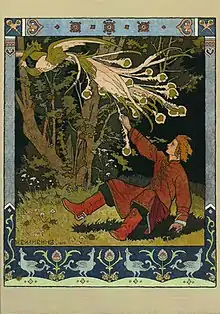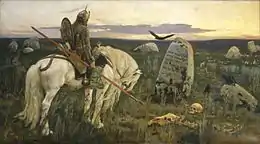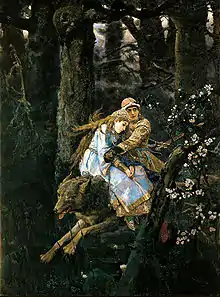Tsarevitch Ivan, the Firebird and the Gray Wolf
"Tsarevich Ivan, the Firebird and the Gray Wolf" (Russian: Сказка об Иване-царевиче, жар-птице и о сером волке) is a Russian fairy tale[1] collected by Alexander Afanasyev in Russian Fairy Tales.[2]

It is Aarne-Thompson type 550, the quest for the golden bird/firebird. Others of this type include "The Golden Bird", "The Greek Princess and the Young Gardener", "The Bird 'Grip'", "How Ian Direach got the Blue Falcon", and "The Nunda, Eater of People".[3]
Synopsis
A king's apple tree bore golden apples, but every night, one was stolen. Guards reported that the Firebird stole them. The king told his two oldest sons that the one who caught the bird would receive half his kingdom and be his heir. They drew lots to see who would be first, but both fell asleep; they tried to claim it had not come, but it had stolen an apple. Finally Ivan Tsarevich, the youngest son, asked to try; his father was reluctant because of his youth but consented. Ivan remained awake the entire time, and upon seeing the bird, tried to catch it by the tail. Unfortunately, Ivan only managed to grasp one feather. The Firebird did not return, but the king longed for the bird. He said that still, whoever caught it would have half his kingdom and be his heir.

The older brothers set out. They came to a stone that said whoever took one road would know hunger and cold; whoever took the second would live, though his horse would die; and whoever took the third would die, though his horse would live. They did not know which way to take, and so took up an idle life.

Ivan begged to be allowed to go until his father yielded. He took the second road, and a wolf ate his horse. He walked until he was exhausted, and the wolf offered to carry him. It brought him to the garden where the firebird was and told him to take it out without touching its golden cage. The prince went in, but thought it was a great pity not to take the cage, but when he touched it, bells rang, waking everyone, and he was captured. He told his story, and the First King said he could have had it for the asking, but he could be spared now only if he could present the king with the Horse with the Golden Mane.
He met the wolf and admitted to his disobedience. It carried him to the kingdom and stables where he could get the horse and warned him against the golden bridle. Its beauty tempted him, and he touched it, and instruments of brass sounded. He was captured, and the Second King told him that if he had come with the word, he would have given him the horse, but now he would be spared only if he brought him Helen the Beautiful to be his wife.
Ivan went back to the wolf, confessed, and was brought to her castle. The wolf carried her off, but Ivan was able to assuage her fears. Ivan brought her back to the Second King, but wept because they had come to love each other. The wolf turned itself into the form of the princess and had Ivan exchange it for the Horse with the Golden Mane. Ivan and Helen rode off on the Horse. The wolf escaped the king. It reached Ivan and Helen, and Helen rode the horse and Ivan the wolf. Ivan asked the wolf to become like the horse and let him exchange it for the Firebird, so that he could keep the horse as well. The wolf agreed, the exchange was done, and Ivan returned to his own kingdom with Helen, the horse, and the Firebird.
The wolf said its service was done when they returned to where it had eaten Ivan's horse. Ivan dismounted and lamented their parting. They went on for a time and slept. His older brothers found them, killed Ivan, sliced his body to pieces, and told Helen that they would kill her if she would not say that they had fairly won the horse, the firebird, and her. They brought them to their father, and the second son received half the kingdom, and the oldest was to marry Helen.
The Grey Wolf found Ivan's body and caught two fledgling crows that would have eaten it. Their mother pleaded for them, and the wolf sent her to fetch the water of death, which restored the body, and the water of life, which revived him. The wolf carried him to the wedding in time to stop it; the older brothers were made servants or killed by the wolf, but Ivan married Helen and lived happily with her.
Translations
The name of the Slavic Firebird is commonly kept as such in English translations. However, the bird can also be known by the name Ohnivak[4] Zhar Bird[5] or Bird Zhar;[6] Glowing Bird,[7] or The Bird of Light.[8]
This tale in particular was translated into English with the name The Tale of Iván Tsarévich, the Bird of Light, and the Grey Wolf.[9] Another English version, by author Edith Hodgetts changed the bird to a cassowary, as in The Grey Wolf and the Golden Cassowary.[10] A third translation gave the general name of Magic Bird to the Firebird.[11][12]
Variants
Folklorist Jeremiah Curtin noted that the Russian, Slavic and German variants are many.[13]
In a Russian variant, Ivan Tsarevich, the Gray Wolf and Elena the Most Beautiful, the prince must take part in a chain of deals: in order to obtain the golden bird, he first must capture the golden-maned horse from another kingdom; but, if he intends to obtain the horse, he must first kidnap foreign Princess Elena and deliver her to the tsar who owns the horse.[14] A second Russian variant with a similar name was collected, titled Ivan Tsarevich and the Gray Wolf.[15]
Austrian writer and journalist Johann Nepomuk Vogl (de) published in 1841 a variant titled Das Märchen vom Vogel Schar, dem Pferd mit der goldenen Mähne und vom grauen Wolf ("The Tale of the Bird Schar, the Golden-Maned Horse and the Gray Wolf"): a Tsar named Wislaw Undronovitch has three sons, Dmitri, Vasili and Ivan Tsarevich. The tsar orders his sons to guard their garden from a nocturnal thief, but only Ivan discovers the culprit: a brilliant golden bird. After this revelation, the tsar sends his sons on a quest for the bird.[16]
Ivan Khudyakov (ru) collected a variant titled "Жаръ-птица".[17]
Adaptations
Russian Romantic writer Vasily Zhukovsky adapted the tale into verse form in his poem "Сказка о Иване-царевиче и Сером Волке" ("The Tale of Ivan Tsarevich and the Grey Wolf").[18]
The WEBTOON comic, The Red King, by Heylenne is loosely based on this tale.
See also
References
- Afanasyev, Alexander (29 July 2012). The Tale of Tsarevich Ivan, the Firebird, and the Grey Wolf (Illustrated). ISBN 9781909115118.
- Post Wheeler, Russian Wonder Tales, "Foreword"
- Heidi Anne Heiner, "Tales Similar to the Firebird"
- Harding, Emily J. Fairy tales of the Slav peasants and herdsmen. London: G. Allen. 1886. pp. 265-292.
- Pyle, Katherine. Fairy Tales of Many Nations. New York: E.P. Dutton & Co. 1911. pp. 118-139.
- Bain, R. Nisbet. Cossack fairy tales and folk tales. London : G.G. Harrap & Co.. 1916. pp. 95-104.
- "Tzarevich Ivan, the Glowing Bird and the Grey Wolf" In: Wheeler, Post. Russian wonder tales: with a foreword on the Russian skazki. London: A. & C. Black. 1917. pp. 93-118.
- Russian Folk-Tales by Alexander Nikolaevich Afanasyev. Translated by Leonard Arthur Magnus. New York: E. P. Dutton and Company. 1916. pp. 78-90.
- Afanasyev, Alexander. Russian Folk-Tales. Edited and Translated by Leonard A. Magnus. New York: E. P. Dutton and Co. 1915. pp. 78-90.
- Hodgetts, Edith M. S. Tales and Legends from the Land of the Tzar: Collection of Russian Stories. Griffith Farran & Co. 1891. pp. 179-193.
- Gask, Lilian. Folk tales from many lands. New York: Crowell. 1910. pp. 111-133.
- Gask, Lillian M. "Prince Ivan and the Gray Wolf". In: The Junior Classics, Volume 2: Folk Tales and Myths. Selected and arranged by William Patten. New York: P. F. Collier and Son. 1912. pp. 195-212.
- Curtin, Jeremiah. Myths and Folk-tales of the Russians, Western Slavs, and Magyars. Boston: Little, Brown, and Company. 1890. p. 349.
- Haney, Jack, V. An Anthology of Russian Folktales. London and New York: Routledge. 2015 [2009]. pp. 110-115. ISBN 978-0-7656-2305-8
- Haney, Jack, V. An Anthology of Russian Folktales. London and New York: Routledge. 2015 [2009]. pp. 44-56. ISBN 978-0-7656-2305-8
- Vogl, Johann Nepomuk. Die ältesten Volksmärchen der Russen. Wien: Verlag von Pfantsch & Compagnie. 1841. pp. 21-44.
- Худяков, Иван Александрович. "Великорусскія сказки". Вып. 1. М.: Издание К. Солдатенкова и Н. Щепкина, 1860. pp. 1—7.
- Zhukovsky, Vasily. (in Russian) – via Wikisource.
External links
- Annotated tale at SurLaLune Fairytales (The elder brothers are made servants)
- Illustrated tale at The Russian Folk Art (The elder brothers are killed by the wolf)